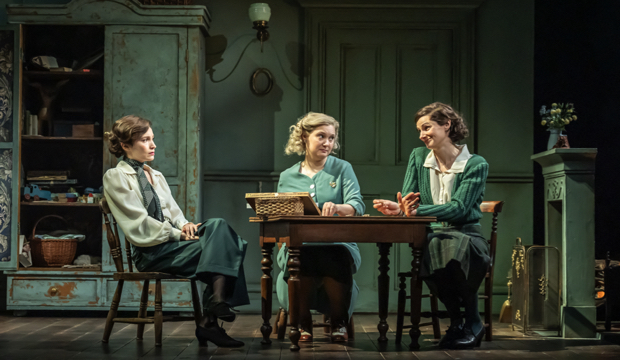National Theatre, Dear Octopus Review ★★★★★
Lindsay Duncan (Dora) in Dear Octopus at the National Theatre © Marc Brenner
There’s no plot as such in Dear Octopus, unless you count a very thin thread of seemingly unrequited love that comes to a rushed happy conclusion; rather, Dodie Smith’s 1938 play is a look at family dynamics set in the days leading to World War II.
Four generations gather at the family’s sprawling country home to celebrate the golden wedding anniversary of Dora, the matriarch whom Lindsay Duncan, in a finely judged performance, imbues with stern but gentle authority, and Charles (Malcolm Sinclair). Throughout the following two and half hours or so, the characters are fleshed out to a certain extent, and their interactions constitute the substance of the play.
There are three daughters: Cynthia (Bethan Cullinane), a woman ‘with a past,’ Hilda (Jo Herbert), a highly-strung professional, and Margery (Amy Morgan), a stay at home mother-of-two.

Bethan Cullinane (Cynthia), Amy Morgan (Margery) and Jo Herbert (Hilda) in Dear Octopus at the National Theatre © Marc Brenner
Their brother Nicholas (Billy Howie) is a breezy thirty-something bachelor, the object of the seemingly hopeless affections of Fenny (Bessie Carter), Dora’s young companion. There is also Edna (Pandora Colin), the somewhat bitter widow of another son, Peter; her son Hugh (Tom Glenister) and his young wife Laurel (Syakira Moeladi) with their baby; and finally the vampish Belle (Kate Fahy), a bit of a blast from the past, arrived from America to create just a touch of disquiet in Dora and Charles happy marriage.
As befits the times and the family's well-to-do circumstances, there is also household staff and a nanny.
Frankie Bradshaw’s splendidly realistic set uses the Lyttelton stage well, rotating between living room, dining room and nursery. The house itself, with its nooks and crannies harbouring memories and ghosts, becomes a character, with the family exchanging plausibly mundane dialogue, spiced up with the occasional gentle barb, as they busy themselves in anticipation of the big anniversary party.
Just occasionally snatches of radio news tell of the latest ominous developments in the run up to what we know to have been World War II, but this seems not to disturb the family's bustling domesticity, even though the previous war still casts a shadow over their lives.
And so it goes on, any expectations that something might happen slowly but surely dispelled, building up to a climax of sorts: the big anniversary speech given by Nicholas, which amounts to a pean to the family, ‘that dear octopus, whose tentacles we never quite escape, nor, in our innermost hearts, quite wish to.’
Directed with an assured hand by Emily Burns, Dear Octopus is essentially a period piece (an etiquette advisor is credited), a snapshot frozen in time and momentarily brought to life by an excellent ensemble, children included.
Four generations gather at the family’s sprawling country home to celebrate the golden wedding anniversary of Dora, the matriarch whom Lindsay Duncan, in a finely judged performance, imbues with stern but gentle authority, and Charles (Malcolm Sinclair). Throughout the following two and half hours or so, the characters are fleshed out to a certain extent, and their interactions constitute the substance of the play.
There are three daughters: Cynthia (Bethan Cullinane), a woman ‘with a past,’ Hilda (Jo Herbert), a highly-strung professional, and Margery (Amy Morgan), a stay at home mother-of-two.

Bethan Cullinane (Cynthia), Amy Morgan (Margery) and Jo Herbert (Hilda) in Dear Octopus at the National Theatre © Marc Brenner
Their brother Nicholas (Billy Howie) is a breezy thirty-something bachelor, the object of the seemingly hopeless affections of Fenny (Bessie Carter), Dora’s young companion. There is also Edna (Pandora Colin), the somewhat bitter widow of another son, Peter; her son Hugh (Tom Glenister) and his young wife Laurel (Syakira Moeladi) with their baby; and finally the vampish Belle (Kate Fahy), a bit of a blast from the past, arrived from America to create just a touch of disquiet in Dora and Charles happy marriage.
As befits the times and the family's well-to-do circumstances, there is also household staff and a nanny.
Frankie Bradshaw’s splendidly realistic set uses the Lyttelton stage well, rotating between living room, dining room and nursery. The house itself, with its nooks and crannies harbouring memories and ghosts, becomes a character, with the family exchanging plausibly mundane dialogue, spiced up with the occasional gentle barb, as they busy themselves in anticipation of the big anniversary party.
Just occasionally snatches of radio news tell of the latest ominous developments in the run up to what we know to have been World War II, but this seems not to disturb the family's bustling domesticity, even though the previous war still casts a shadow over their lives.
And so it goes on, any expectations that something might happen slowly but surely dispelled, building up to a climax of sorts: the big anniversary speech given by Nicholas, which amounts to a pean to the family, ‘that dear octopus, whose tentacles we never quite escape, nor, in our innermost hearts, quite wish to.’
Directed with an assured hand by Emily Burns, Dear Octopus is essentially a period piece (an etiquette advisor is credited), a snapshot frozen in time and momentarily brought to life by an excellent ensemble, children included.
TRY CULTURE WHISPER
Receive free tickets & insider tips to unlock the best of London — direct to your inbox
| What | National Theatre, Dear Octopus Review |
| Where | National Theatre, South Bank, London, SE1 9PX | MAP |
| Nearest tube | Waterloo (underground) |
| When |
07 Feb 24 – 27 Mar 24, 19:30 Some performances at 18:30. Wed & Sat mats at 14:00. Dur.: 2 hours 45 mins inc one interval |
| Price | £20-£96 |
| Website | Click here to book |